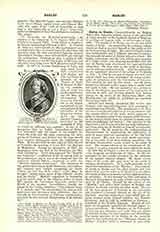

Harlez de Deulin, CHARLES-JOSEPH DE, Belgian Orientalist, domestic prelate, canon of the cathedral of Liege, member of the Academie Royale of Belgium; b. at Liege, August 21, 1832; d. at Louvain, July 14, 1899. The family of de Harlez was an old and noble family of Liege. On completing his ordinary college course de Harlez devoted himself to the study of law in the University of Liege. His success in legal studies was considerable, and a brilliant doctorate examination brought his career at the law school to a close. His family connections and his own ability gave promise of a bright future, but, growing dissatisfied with the law, de Harlez soon abandoned the legal profession altogether. He then took up the study of theology, and in 1858 was ordained priest. After his ordination he was appointed director of the college of St-Quirin at Huy. In 1867 he was put in charge of a new arts’ school which had been established for young ecclesiastics in connection with the University of Louvain. This position he held for four years. An old predilection for Oriental studies began then to make itself felt again in him. He was appointed to a professor-ship in the Oriental department of the University of Louvain in 1871 and devoted himself with intense energy to the study of the Zoroastrian Bible—the Zend-Avesta—of which he published an excellent translation (1875-77).
Spiegel had already translated the Avesta into German and Anquetil-Duperron had attempted a translation into French. The translation of de Harlez was a considerable addition to Avesta exegesis, and the second edition of the work, which appeared in 1881, is still most useful to the student of Old Persian. In the second edition there is a preface of much value both for philology and history. The relations of the Rig-Veda to the Avesta were not yet fully understood, and these relations de Harlez set himself to determine accurately. He did much for the understanding of Zoroastrianism by emphasizing the differences, in spite of many apparent agreements, of the Rig-Veda and Avesta. His view met with much opposition, but at last some of his most brilliant opponents—for instance Darmesteter—came round to his point of view. The second edition of his translation of the Avesta is in many respects his most important work.
In 1883 Msgr. de Harlez turned to a new department—the language and literature of China. In this department he was chiefly attracted by the problems of the ancient Chinese religion. He shows every-where in his works this same taste for the study of religious developments. To it ought probably to be traced the foundation of the “Museon”. This journal, of which de Harlez was the chief founder and first chief editor, was intended to be devoted to the objective study of history generally and of religious history in particular. It was founded in 1881, and many of the most important of its early articles were contributed by de Harlez. Though he was editor of the “Museon” and still a keen student of Iranian and Chinese, de Harlez had time for other work. He was all the time professor of Sanskrit in the university and produced a Sanskrit manual for the use of his students. Another department with which this untiring student made himself familiar was Manchu literature; and in 1884 he published at Louvain a handbook of the Manchu language. Besides all this work he frequently contributed learned papers to various periodicals. His influence on the University of Louvain was immense, and under him the school of Oriental studies was most popular and flourishing. The actual position of de Harlez in the scientific world is best indicated by the “Melanges Charles de Harlez” (Leyden, 1896), a collection of more than fifty scientific articles written by scholars of all countries and creeds, presented to him on the twenty-fifth anniversary of his Louvain professorship. The “Melanges” is a striking monument to his ability, energy, and love of truth.
Besides the works mentioned above de Harlez published the following important studies: “Manuel de la langue de l’ Avesta” (Paris, 1879; 2nd ed., 1888); “Manuel du Pehlevi” (Paris, 1880); “Etudes eraniennes” (Paris, 1880); “La Bible dans l’Inde” (Paris, 1882); “Le texte originaire du Yih-King”; “Vedisme, brahmanisme et christianisme” (Brussels, 1881); etc.
PATRICK BOYLAN

